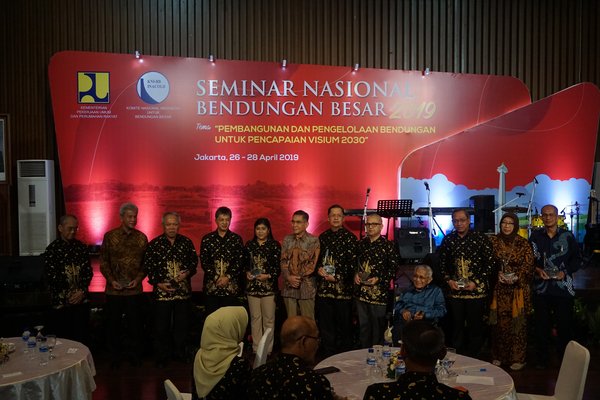It focuses on strategies to improve human resources and new smart concept for sustainable benefits.
JAKARTA. Indonesia, April 29, 2019 /PRNewswire/ -- The Indonesia's National Committee on Large Dams (INACOLD) and the Directorate General of Water Resources Ministry of Public Works and Housing held the National Seminar on Large Dams 2019 entitled "The Construction & Maintenance of Dam to Attain Vision 2030" on April 26-28, 2019. Attended by over 600 dam experts and professionals, it demonstrated 48 papers to offer recommendations for Indonesia's sustainable water security, focusing on human resources and smart system.

"In addition to skills regeneration, we now collaborate with experts and advisors from South Korea and Japan to improve knowledge and technology about innovative dam and reservoir system. Periodically, they tour around the dam in Indonesia to report any problems encountered during the visit. This will sharpen our quick intuition to anticipate problems and find ways to address risks," said Basuki Hadimuljono, Indonesian Minister of Public Work & Public Housing.
The total number of dams in Indonesia can only irrigate around 11% of agricultural land, of the total 7.3 million hectares throughout the nation. "By achieving the target of 65 new dams in Indonesia, the irrigated agricultural land can significantly increase to 20%. With the dam's existence, we can do the planting process over twice a year, compared to only once a year by rainfalls," added Basuki.
According to a data by Ministry of Public Works & Public Housing Republic of Indonesia, in 2018, Indonesia has finished the new development of 14 dams, from the total target of 65 dams. This means, by the end of 2019, around 29 dams are expected to be completed, with the addition of 10 new dam's construction in 2019.
"We need to increase human resources, innovation, and a more well-planned program in a clear direction. Moreover, with the water challenges in Indonesia that only reach 50 m3 per capita per year, it's far below Thailand that now reaches 1,200 m3 per capita per year. Aligns with the Vision 2030, we will put more efforts to meet the capacity of 1,200 m3 per capita per year in Indonesia by 2030," said Hari Suprayogi, Directorate General of Water Resources, Ministry of Public Works & Housing Republic of Indonesia.
To accelerate the target, the seminar sessions also highlighted new recommendations for human resources, quality, dam rehabilitation, extreme weather control, as well as natural disaster mitigation for dam improvement. The topics were presented in the 48 papers by all participants. It also demonstrated the reservoir and dam smart system, as well as new strategies for sustainable dam development.
"One of the strategies is to construct a dam with longer durability. For example, if it's designed for longevity of 50 years, it should be functioned for at least 50 years. In this case, construction is not the only matter. We have to focus on the maintenance, because once abandoned, reservoirs will definitely die," added Basuki.
To optimize maintenance and maximize function, Indonesian Ministry of Public Works & Public Housing and INACOLD) have now started to implement an ICT-based smart reservoir system operation with the huge benefit in water stored efficiency and food security. In efforts to anticipate extreme weather and disaster, they have created new innovation in real-time reservoirs system to minimize the flooding damage.
As a hazard mitigation plan, the Directorate General of Water Resources has now integrated with the Agency for Meteorology, Climatology, and Geophysics (BMKG). Thus, when a risk occurred along the streams, we can decide an action right away. During a dry season, BMKG will provide weather and climate-related data to measure the amount of water, to accurately help irrigation from the reservoir.
About the Directorate General of Water Resources
The Directorate General of Water Resources, under the Ministry of Public Works and Housing, has critical roles in formulating and implementing water resources management policies, provided in compliance with relevant legislation.
In order to perform their duties in accordance with the Directorate General of Water Resources, their functions are: policy formulation in the field of water resources conservation, utilization of water resources and to control water damage on surface water resources, and utilization of groundwater in accordance with the provisions of legislation; implementation of integrated water resource management in compliance with the provisions of legislation; preparation of the norms, standards, procedures, and criteria in the field of water resources management; provision of technical guidance and supervision related to water resources management; implementation of evaluation and reporting regarding to water resources management; implementation of the administration of the Directorate General of Water Resources; and implementation of other functions provided by the Minister.